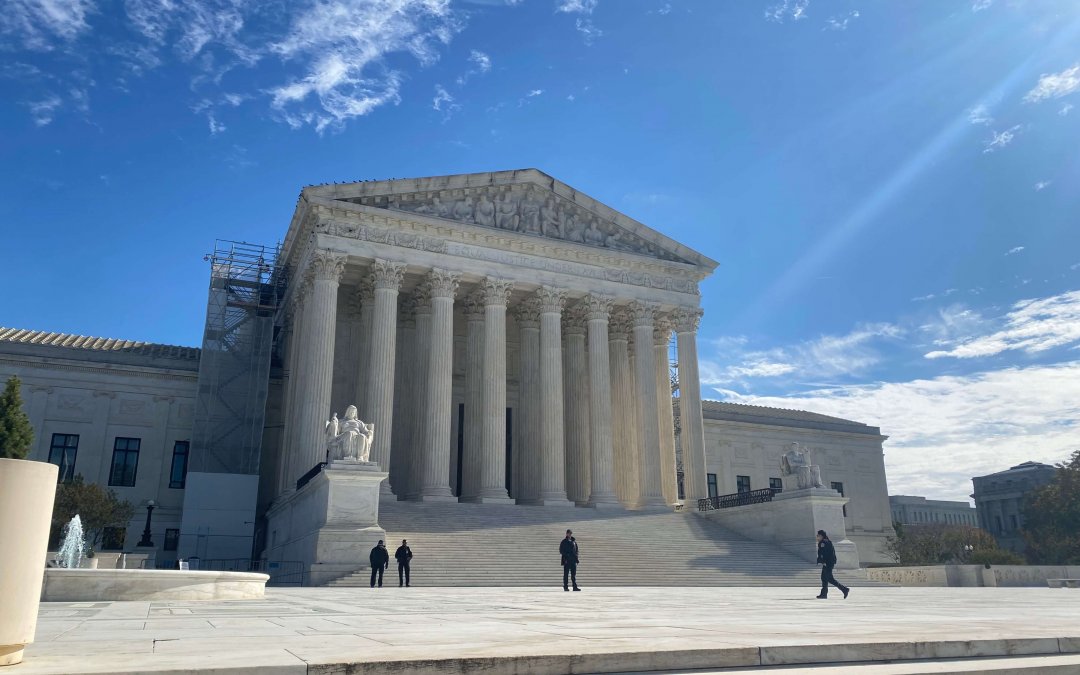WASHINGTON – The Supreme Court heard oral arguments Tuesday in a case involving commercial truckers that could expand the definition of transportation workers to include people who drive goods for companies that are not in the transportation sector.
The case, Bissonnette v. LePage Bakeries Park St., involves whether workers who were treated as independent contractors are exempt from settling disputes via arbitration as set forth in the Federal Arbitration Act of 1926. Companies like Amazon are following the case closely to see if it would have implications for the way it treats its independent contractors who transport their goods.
Neil Bissonnette is part of a group of truckers who filed a wage-dispute lawsuit against Flowers Foods, the company that makes Wonder Bread and other baked goods. The act in question exempts employment contracts of “seamen, railroad employees, or any other class of workers engaged in foreign or interstate commerce.” The court must decide whether Bissonnette and his fellow truckers fall under that exemption from arbitration.
Flowers and its distributor, Lepage Bakeries, tried to argue that Bissonnette and his colleagues don’t qualify for the exemption and thus must go through mandatory arbitration rather than the court system for any dispute.
In a similar case, Domino’s Pizza, LLC v. Carmona, the U.S. Court of Appeals for the Ninth Circuit recently held that workers performing similar duties, such as delivering pizza, are exempt from mandatory arbitration because they are “engaged in foreign or interstate commerce.”
Most of the justices’ questions focused on the language of the controversial exemption.
Justice Amy Coney Barrett asked the workers’ lawyer, Jennifer Bennett, about the history and current applicability of the exemption.
Bennett spoke of the labor strikes beginning in 1919, fueled by workers on lumber boats and in shipyards employed by companies in industries other than transportation.
“Group-based arbitration makes transparent issues that are coming up amongst transportation workers before they end up in nationwide strikes that are going to interrupt national commerce,” she said.
Bennett’s principal argument was that the original language in the exemption said nothing about whether an employer sold transportation.
She also argued that Flowers Foods was being too narrow in its definition of “seamen” because their truckers were engaging in the transport of goods just as “seamen” aboard a ship carry goods for trade and commerce.
“Even if we were to accept every single one of Flowers’ arguments on seamen, they still haven’t shown that this employer-based industry requirement has anything to do with the words of the statute,” Bennett said.
The justices took a harder line with Traci Lovitt, the lawyer for Flowers Foods and its distributor, Lepage Bakeries.
Lovitt argued the plaintiffs provided too broad of a definition for “seamen” and called their argument “flatly inconsistent with the notion of a transportation worker,” as well as in a previous case involving the same law. She also said the independent truck drivers – who she argued are owners of the baked goods rather than employees of the bakery – “look nothing like railroad employees or seamen.”
Justice Ketanji Brown Jackson asked Lovitt about the source of her argument that workers must be in the industry to be exempt from arbitration, claiming Congress did not write the limitation in the statute.
Though Lovitt attempted to answer Jackson’s question, the justice continued to probe, “Where is the industry piece coming from?”
In her dissent, Bennett said she didn’t hear an argument from the justices that the text implied an employee needed to work for a transportation company.
“If Congress were really trying to get at people who could disrupt commerce, they would not have included an employer-based limitation. I think that’s why we don’t see one in the statute,” she said.
Bennett said the employer-based industry test would be challenging to apply; therefore Congress didn’t include the requirement in the statute in 1926.
Justice Brett Kavanaugh said the number of workers who will be exempt and companies who will go to court will be “massive” if the respondents lose.
The court is expected to issue a decision by the end of its current term in June.

